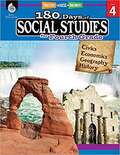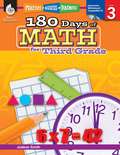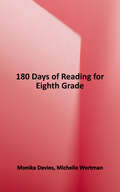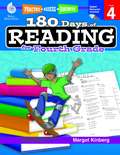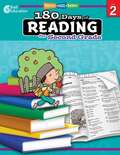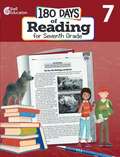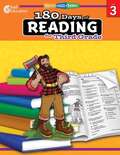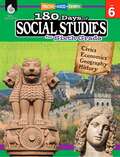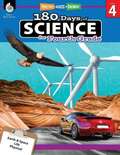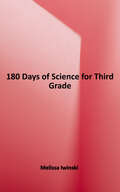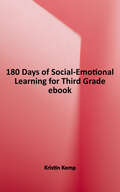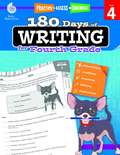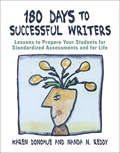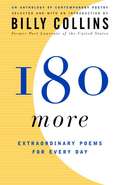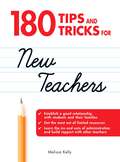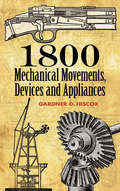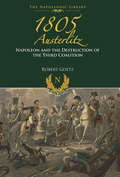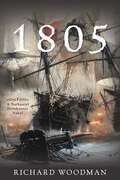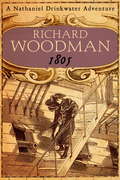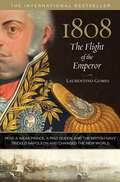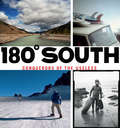- Table View
- List View
180 Days Of Social Studies For Fourth Grade: Civics, Economics, Geography, History
by Shell Education Staff Margaret WilliamsonSupplement your social studies curriculum with 180 days of daily practice! This essential classroom resource provides teachers with weekly social studies units that build students' content-area literacy, and are easy to incorporate into the classroom. Students will analyze primary sources, answer text-dependent questions, and improve their grade-level social studies knowledge. Each week covers a particular topic within one of the four social studies disciplines: history, economics, civics, and geography. Aligned to the National Council for the Social Studies (NCSS) and state standards, this resource includes digital materials.
180 Days of MATH for Third Grade: Practice-Assess-Diagnose
by Jodene SmithThis book provides third-grade students with 180 daily practice activities to build their mathematical fluency. Each problem is tied to a specific mathematical concept to help students gain regular practice of key grade-level skills.
180 Days of Reading for Eighth Grade
by Monika Davies Michelle WertmanThis book provides learning activities that build confidence with reading and writing - Incorporates thematic units and a combination of fiction, nonfiction, and nontraditional texts - Makes at-home learning, whole class instruction, or small group support quick and easy - Includes a complete answer key to assess and diagnose student understanding Parents appreciate the grade-appropriate reading passages and meaningful topics that children will enjoy. The daily reading practice in this activity book is ideal for homeschool, to reinforce learning at school, or to prevent learning loss over summer. Teachers rely on these daily practice workbooks to save them valuable time. The standards-based activities are great for classroom or at-home learning. The activities can also be used for differentiation and to address learning gaps.
180 Days of Reading for Fourth Grade: Practice, Assess, Diagnose
by Margot KinbergHelps fourth-grade students to build their reading comprehension and word study skills using daily practice activities.
180 Days of Reading for Second Grade (Reference, Information and Interdisciplinary Subjects)
by Christine DuganBuild reading Comprehension and word Study Skills in second grade using daily Practice activities. Teachers and parents will find this resource perfect to use in the classroom or at home.
180 Days of Reading for Seventh Grade
by Joe Rhatigan Monika Davies Jennifer EdgertonBuild advanced reading skills with engaging and meaningful daily practice activities designed for seventh grade students. 180 Days: Reading for Seventh Grade: Offers learning activities that boost confidence with reading and writing Incorporates thematic units and a combination of fiction, nonfiction, and nontraditional texts Makes at-home learning, whole class instruction, or small group support quick and easy Includes a complete answer key to assess and diagnose student understanding Parents appreciate the grade-appropriate reading passages and fascinating topics that children will love. The daily reading practice in this activity book is great for homeschool, to reinforce learning at school, or to prevent learning loss over summer. Teachers rely on these daily practice workbooks to save them valuable time. The standards-based activities are perfect for classroom or at-home learning. The activities can also be used for differentiation and to address learning gaps.
180 Days of Reading for Third Grade
by Christine DuganRegular practice is the best way to reinforce concepts and allow students to gain confidence and mastery of skills. With 180 Days of Reading for Third Grade you get reading and critical thinking exercises for students for every day of the school year. <p><p>Presented in a consistent format from week to week, the activities in 180 Days of Reading allow students to progress in reading comprehension and word study skills, making diagnostics and assessments easy for parents and educators. Through both fiction and nonfiction reading passages, students get purposeful practice in engaging with diverse texts appropriate for their grade level. <p><p>Ideal for after school study, intervention, or homework, 180 Days of Reading workbook activities are correlated to College and Career Readiness and other state standards. In addition to reading passages, data-driven assessment tips as well as digital versions of the assessment analysis tools are provided. <p><p>With text passages that advance in complexity throughout the year, student learning is enriched by developing and honing skills of reading comprehension, interpretation of symbols, making logical inference, summarizing and responding to literature, and more. <p><p>Boost your Third Grader's reading skills in a hurry with the easy-to-use activities in 180 Days of Reading!
180 Days of SOCIAL STUDIES for Sixth Grade
by Kathy Flynn Μ. Ed. Terri McNamara Marla Tomlinson'Help sixth grade students build social studies content knowledge with fun and effective daily practice activities. 180 Days: Social Studies: Focuses on a new topic each week covering one of the four social studies disciplines: history, civics, geography, and economics Builds student’s confidence with quick independent learning activities focusing on analytical skills Makes at-home learning, whole class instruction, or small group support, quick and easy Includes standards-based activities, easy to follow instructions, and an answer key to quickly assess student understanding Parents appreciate the teacher-approved activity books that keep their child engaged and learning. Great for homeschooling, to reinforce learning at school, or prevent learning loss over summer. Teachers rely on the daily practice workbooks to save them valuable time. The ready to implement activities are perfect for daily morning review or homework. The activities can also be used for intervention skill building to address learning gaps. Supports the C3 Framework and aligns to the NCSS curriculum standards.
180 Days of Science for Fourth Grade: Practice, Assess, Diagnose
by Lauren Homayoun180 Days of Science is a fun and effective daily practice workbook designed to help students explore the three strands of science: life, physical, and earth and space. <P><P>This easy-to-use fourth grade workbook is great for at-home learning or in the classroom. The engaging standards-based activities cover grade-level skills with easy to follow instructions and an answer key to quickly assess student understanding. Students will explore a new topic each week building content knowledge, analyzing data, developing questions, planning solutions, and communicating results. Watch as students are motivated to learn scientific practices with these quick independent learning activities. Parents appreciate the teacher-approved activity books that keep their child engaged and learning. Great for homeschooling, to reinforce learning at school, or prevent learning loss over summer. <P><P>Teachers rely on the daily practice workbooks to save them valuable time. The ready to implement activities are perfect for daily morning review or homework. The activities can also be used for intervention skill building to address learning gaps. Aligns to Next Generation Science Standards (NGSS).
180 Days of Science for Third Grade: Practice, Assess, Diagnose
by Shell Education Melissa Iwinski180 Days of Science is a fun and effective daily practice workbook designed to help students explore the three strands of science: life, physical, and earth and space. This easy-to-use third-grade workbook is great for at-home learning or in the classroom. The engaging standards-based activities cover grade-level skills with easy to follow instructions and an answer key to quickly assess student understanding. Students will explore a new topic each week building content knowledge, analyzing data, developing questions, planning solutions, and communicating results. Watch as students are motivated to learn scientific practices with these quick independent learning activities. Parents appreciate the teacher-approved activity books that keep their child engaged and learning. Great for homeschooling, to reinforce learning at school, or prevent learning loss over summer. Teachers rely on the daily practice workbooks to save them valuable time. The ready to implement activities are perfect for daily morning review or homework. The activities can also be used for intervention skill building to address learning gaps. Aligns to Next Generation Science Standards (NGSS).
180 Days of Social-emotional Learning For Third Grade (180 Days of Practice Ser.)
by Kristin KempAn effective third-grade workbook that provides daily social and emotional learning (SEL) activities to help students explore emotions, actions, relationships, and decision-making. The daily activities connect to the CASEL competencies, mindfulness, and key effective education initiatives. This SEL workbook makes at-home learning, whole class instruction, or small group support, quick and easy. Help students build self-awareness, analyze relationships, discover diverse perspectives, and apply what they have learned with engaging lessons. The use of fiction and nonfiction text allows for self-reflection and growth. Parents appreciate the teacher-approved activity books that keep their child engaged and learning. Great for homeschooling, reinforcing learning at school, and building connections between home and school. Teachers rely on the daily practice workbooks to save them valuable time. The ready-to-implement activities are perfect to introduce SEL topics for discussion.
180 Days of Writing for Fourth Grade: Practice, Assess, Diagnose
by Kristin KempWith 180 Days of Writing, creative, theme-based units guide students as they practice the five steps of the writing process: prewriting, drafting, revising, editing, and publishing.
180 Days to Successful Writers: Lessons to Prepare Your Students for Standardized Assessments and for Life
by Karen Donohue Nanda N. ReddyLesson plans linked to national standards help students develop lifelong writing skills and confidence as writers while preparing them for standardized writing tests.
180 More: Extraordinary Poems for Every Day
by Billy CollinsCome full circle with 180 new, exciting poems selected and introduced by Billy Collins. Inspired by Billy Collins's poem-a-day program for American high schools that he began through the Library of Congress, the original Poetry 180: A Turning Back to Poetry was a gathering of clear, contemporary poems aimed at a wide audience. In180 More, Collins continues his ambitious mission of exposing readers of all ages to the best of today's poetry. Here are another 180 hospitable, engaging, reader-friendly poems, offering surprise and delight in a wide range of literary voices-comic, melancholy, reflective, irreverent. If poetry is the original travel literature, this anthology contains 180 vehicles ready to carry you away to unexpected places. With poems by Robert Bly Carol Ann Duffy Eamon Grennan Mark Halliday Jane Kenyon David Kirby Thomas Lux Donna Masini W. S. Merwin Paul Muldoon Carol Muske-Dukes Vijay Seshadri Naomi Shihab Nye Gerald Stern Ron Padgett Linda Pastan Victoria Redel Franz Wright Robert Wrigley and many more.
180 Tips and Tricks for New Teachers
by Melissa KellyLooking for ways to fix your novel? Or: Is your fiction writing in peril?Based on real advice gleaned from thousands of writing critiques, 179 Ways to Save a Novel is more than a collection of ideas for troubleshooting your work-in-progress (though it holds plenty of practical writing advice). This inspiring guide doubles as a thoughtful examination of the writing life-and not just with respect to writing, but to the reading habits and thought processes of writers. The 179 meditations in this book are grouped under six headings: Substance; Structure; Style; Symbol, Myth & Metaphor; Soul; and Other Matters. Dip into the book at random when in need of nonspecific advice, inspiration, or criticism. Or read it straight through for a deeper examination of the writing life. However you encounter them, these meditations are guaranteed to challenge, inspire, provoke--and occasionally to tickle or annoy. But most of all they'll awaken a deeper awareness of the fiction writer's many challenges and thorny choices.About the AuthorPeter Selgin is the author of the Flannery O'Connor Award-winning story collection Drowning Lessons; Life Goes to the Movies, a novel; and By Cunning & Craft: Sound Advice and Practical Wisdom for Fiction Writers.align="center">..."Peter Selgin's 179 Ways to Save a Novel is brimming with sage and inspiring advice. Selgin writes about the craft of the novel with terrific lucidity, insight, and wit and his latest is a book that all aspiring novelists should have on their shelves."--Laura van den Berg, author of What the World Will Look Like When All the Water Leaves Us"... a wise and valuable guide! Selgin's masterful meditations provide the tools, knowledge and incentive to write meaningful fiction. A beautiful, supportive book, 179 Ways to Save a Novel belongs on every serious fiction-writer's desktop."--Mary E. Mitchell, author of Indie Next Great Read novel, Americans In Space"What Peter Selgin talks about when he talks about writing is what every aspiring novelist needs to hear."--John Dufresne, author of The Lie That Tells the Truth
180 Tips and Tricks for New Teachers
by Melissa KellyLooking for ways to fix your novel? Or: Is your fiction writing in peril?Based on real advice gleaned from thousands of writing critiques, 179 Ways to Save a Novel is more than a collection of ideas for troubleshooting your work-in-progress (though it holds plenty of practical writing advice). This inspiring guide doubles as a thoughtful examination of the writing life-and not just with respect to writing, but to the reading habits and thought processes of writers.The 179 meditations in this book are grouped under six headings:SubstanceStructureStyleSymbol, Myth & MetaphorSouland Other MattersDip into the book at random when in need of nonspecific advice, inspiration, or criticism. Or read it straight through for a deeper examination of the writing life. However you encounter them, these meditations are guaranteed to challenge, inspire, provoke-and occasionally to tickle or annoy. But most of all they'll awaken a deeper awareness of the fiction writer's many challenges and thorny choices.
1800 Mechanical Movements, Devices and Appliances
by Gardner D. HiscoxA fascinating compendium of early-twentieth-century mechanical devices, this wide-ranging work covers a variety of applications. More than 1,800 engravings—ranging from simple diagrams to detailed cross-sections—illustrate the workings of each item, from simple hooks and levers to complex machinery used in steam, motive, hydraulic, air, and electric power, navigation, gearing, clocks, mining, construction, and more.Compiled as a ready reference for inventors, students of mechanics, artisans, and other workers, this volume features only minimal text. Its true value lies in its wealth of illustrated information, offering the quickest and most satisfactory method of conveying the exact conditions of mechanical action and construction.
1800 Riddles, Enigmas and Conundrums
by Darwin A. HindmanThe book contains 1800 Riddles, Enigmas and Conundrums and the word riddle is used in this collection in a broad sense, as referring to a kind of puzzle--one in the form of a question that is blind, obscure, confusing, or misleading, and is intended to be guessed.
1801 Home Remedies
by Editors at Reader's Digest"This is the kind of practical knowledge that comes in handy all the time."<P> Doctor-approved treatments for everyday health problems, including coconut oil to relive sore gums, catnip to soothe anxiety, tennis balls to stop snoring, and vitamin C to prevent ulcers.<P> The 100-plus health conditions that were selected for this book are absolutely appropriate for you and your family members to treat with home remedies, either by themselves or alongside conventional medical treatment. They focus on things that are practical, convenient, and ultimately doable.
1805 Austerlitz: Napoleon and the Destruction of the Third Coalition
by Robert GoetzThe Battle of Austerlitz is almost universally regarded as the most impressive of Napoleons many victories. The magnitude of the French achievement against a larger army was unprecedented, the great victory being met by sheer amazement and delirium in Paris, where just days earlier the nation had been teetering on the brink of financial collapse. In this insightful study, the author analyses the planning of the opposing forces and details the course of the battle hour by hour, describing the fierce see-saw battle around Sokolnitz, the epic struggle for the Pratzen Heights, the dramatic engagement between the legendary Lannes and Bagration in the north, and the widely misunderstood clash of Napoleons Imperial Guard and Alexanders Imperial Leib-Guard. The author has produced a detailed and balanced assessment of the battle that for the first time places familiar French accounts in their proper perspective and exposes many myths regarding the battle that have been perpetuated and even embellished in recent books. With 1805: Austerlitz, the reader is left with a thorough appreciation of Napoleon and his Grande Armée of 1805, an army that decisively defeated not a hapless relic of the ancien regime but rather a formidable professional army that had fought the French armies on equal terms five years earlier.
1805: A Nathaniel Drinkwater Novel (Nathaniel Drinkwater Novels)
by Richard WoodmanIn the tradition of C.S. Forester, ex-sailor Richard Woodman brings history to life in a rousing tale of daring deeds and clashing cutlasses. it is the summer of 1804 and Napoleon is massing his vast army for the invasion of England. His powerful Combined Fleet is preparing to meet Admiral Nelson's British Fleet in the Battle of Trafalgar. In the annals of history this battle completely decimated the Combined Fleet, ranking second in destructiveness only to the Japanese attack on Pearl Harbor.Captain Nathaniel Drinkwater, newly appointed commander of the frigate Antigone, is preparing for battle off the French coast, as part of Admiral Nelson's highly effective blockade. As the fleets draw together, Drinkwater is unprepared for the irregular role destiny deals him when he becomes a prisoner of the French and takes the brunt of the British bombardment in the orlop of an enemy ship.
1805: Number 6 in series (Nathaniel Drinkwater #6)
by Richard WoodmanIt is the summer of 1804 and Napoleon is massing his vast army for the invasion of England. Nathaniel Drinkwater has command of HMS Antigone, and he and his men are sent to patrol the Channel coast, helping the Royal Navy maintain a blockade of the enemy's ports. As Nelson's and Napoleon's mighty fleets draw closer to one another, Drinkwater is unprepared for the role that destiny deals him when he becomes a prisoner of the French and suddenly finds himself on the wrong side of the British bombardment.
1808: How a Weak Prince, a Mad Queen, and the British Navy Tricked Napoleon and Changed the New World
by Laurentino GomesIn a time of terror for Europe&’s monarchs—imprisoned, exiled, executed—Napoleon&’s army marched toward Lisbon. Cornered, Prince Regent João had to make the most fraught decision of his life. Protected by the British Navy, he fled to Brazil with his entire family, including his deranged mother, most of the nobility, and the entire state apparatus. Until then, no European monarch had ever set foot in the Americas. Thousands made the voyage, but it was no luxury cruise. It took two months in cramped, decrepit ships. Lice infested some of the vessels, and noble women had to shave their hair and grease their bald heads with antiseptic sulfur. Vermin infested the food, and bacteria contaminated the drinking water. Sickness ran rampant. After landing in Brazil, Prince João liberated the colony from a trade monopoly with Portugal. As explorers mapped the burgeoning nation&’s distant regions, the prince authorized the construction of roads, the founding of schools, and the creation of factories, raising Brazil to kingdom status in 1815. Meanwhile, Portugal was suffering the effects of abandonment, war, and famine. Never had the country lost so many people in so little time. Finally, after Napoleon&’s fall and over a decade of misery, the Portuguese demanded the return of their king. João sailed back in tears in 1821, and the last chapter of colonial Brazil drew to a close, setting the stage for the strong, independent nation that we know today, changing the New World forever.
180° South
by Jeff Johnson Yvon Chouinard Doug Tompkins Chris Malloy180° South takes readers behind the scenes of the film, 180° South, made by Chris Malloy, to learn more about the people who made the original overland journey to Patagonia in 1968, and the repeat journey over ocean and land 40 years later. The book includes stories of events and experiences that inspired Chris Malloy, Yvon Chouinard, and Doug Tompkins to choose paths committed to saving what's left of the wild world. Open it anywhere and enjoy the photographs by the world's leading surf and climbing photographers Jeff Johnson, Jimmy Chin, Scotty Soen, and Danny Moder.
